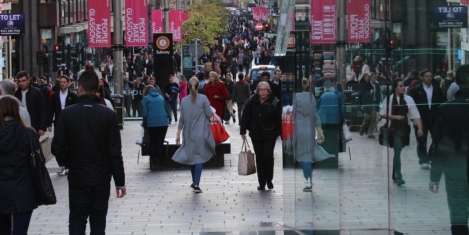To provide the best experiences, we use technologies like cookies to store and/or access device information. Consenting to these technologies will allow us to process data such as browsing behaviour or unique IDs on this site. Not consenting or withdrawing consent, may adversely affect certain features and functions.
The technical storage or access is strictly necessary for the legitimate purpose of enabling the use of a specific service explicitly requested by the subscriber or user, or for the sole purpose of carrying out the transmission of a communication over an electronic communications network.
The technical storage or access is necessary for the legitimate purpose of storing preferences that are not requested by the subscriber or user.
The technical storage or access that is used exclusively for statistical purposes.
The technical storage or access that is used exclusively for anonymous statistical purposes. Without a subpoena, voluntary compliance on the part of your Internet Service Provider, or additional records from a third party, information stored or retrieved for this purpose alone cannot usually be used to identify you.
The technical storage or access is required to create user profiles to send advertising, or to track the user on a website or across several websites for similar marketing purposes.
 St John Ambulance is calling on employers to respond to the impact of the Covid-19 pandemic on workers’ mental health as it launches courses in how to talk about it with employees. (more…)
St John Ambulance is calling on employers to respond to the impact of the Covid-19 pandemic on workers’ mental health as it launches courses in how to talk about it with employees. (more…)






 The new
The new 
 Heralding the age of a more compassionate type of leader, almost eight in ten (76 percent) UK business leaders consider their employees to be friends, not just colleagues, with three quarters (74 percent) admitting they want their employees to like them, claims new research from
Heralding the age of a more compassionate type of leader, almost eight in ten (76 percent) UK business leaders consider their employees to be friends, not just colleagues, with three quarters (74 percent) admitting they want their employees to like them, claims new research from 
 As COVID-19 continues to limit our daily lives, forcing the Government to extend social restrictions into July, restrictions of a different kind are taking their toll on working women, and may be even longer-lasting, according to research from
As COVID-19 continues to limit our daily lives, forcing the Government to extend social restrictions into July, restrictions of a different kind are taking their toll on working women, and may be even longer-lasting, according to research from 
 When considering a hybrid working method for your organisation, it’s far too easy to try think of what will work for all employees as a whole, rather than breaking this down and thinking about the different needs from certain groups of people. One example of this is age and experience. Employees from different age groups and at different levels of experience within in an organisation may have very different needs when it comes to hybrid working. Those who have been with the business, or in a similar work environment, for some time may be perfectly comfortable to work from home the majority of the week, with little help or supervision. However, this probably isn’t going to work as well for younger employees with less experience.
When considering a hybrid working method for your organisation, it’s far too easy to try think of what will work for all employees as a whole, rather than breaking this down and thinking about the different needs from certain groups of people. One example of this is age and experience. Employees from different age groups and at different levels of experience within in an organisation may have very different needs when it comes to hybrid working. Those who have been with the business, or in a similar work environment, for some time may be perfectly comfortable to work from home the majority of the week, with little help or supervision. However, this probably isn’t going to work as well for younger employees with less experience. 
 Research from
Research from 
 Occupiers and landlords of commercial property should partner on a path towards full economic reopening by taking decisive action to address commercial rent challenges, says the
Occupiers and landlords of commercial property should partner on a path towards full economic reopening by taking decisive action to address commercial rent challenges, says the 
 BT has today announced plans to develop a brand new, multi-million pound contact centre in Dundee which will become the new home to around 1,000 employees. The new office will be at West Marketgait in the heart of the city centre, close to the waterfront and part of a £1bn regeneration area. When the building is complete, expected in late 2023, the contact centre will be one of around 30 of BT’s new future-fit offices in the UK, developed as part of its ‘
BT has today announced plans to develop a brand new, multi-million pound contact centre in Dundee which will become the new home to around 1,000 employees. The new office will be at West Marketgait in the heart of the city centre, close to the waterfront and part of a £1bn regeneration area. When the building is complete, expected in late 2023, the contact centre will be one of around 30 of BT’s new future-fit offices in the UK, developed as part of its ‘


 Organisations and businesses have a lot to contend with as they begin to reopen their offices. From social distancing, working from home policies, office layouts, hand gel stations and more. But there also remains one key issue when it comes to welcoming employees back to the office. And that’s how they will get to work in the first place. That’s because the daily commute is going to look a lot different than it did pre-COVID. Firstly, while many employers and workers see the benefit of meeting in person, the hybrid world we now live in will see workers commuting to the office far less frequently. And, if they do travel to the office, there is an element of hesitancy about how they will get there; a recent study revealed
Organisations and businesses have a lot to contend with as they begin to reopen their offices. From social distancing, working from home policies, office layouts, hand gel stations and more. But there also remains one key issue when it comes to welcoming employees back to the office. And that’s how they will get to work in the first place. That’s because the daily commute is going to look a lot different than it did pre-COVID. Firstly, while many employers and workers see the benefit of meeting in person, the hybrid world we now live in will see workers commuting to the office far less frequently. And, if they do travel to the office, there is an element of hesitancy about how they will get there; a recent study revealed 
 New research from
New research from 







July 8, 2021
Not waving, but drowning: why we need to take languishing more seriously
by Dr Melanie James • Comment, Wellbeing